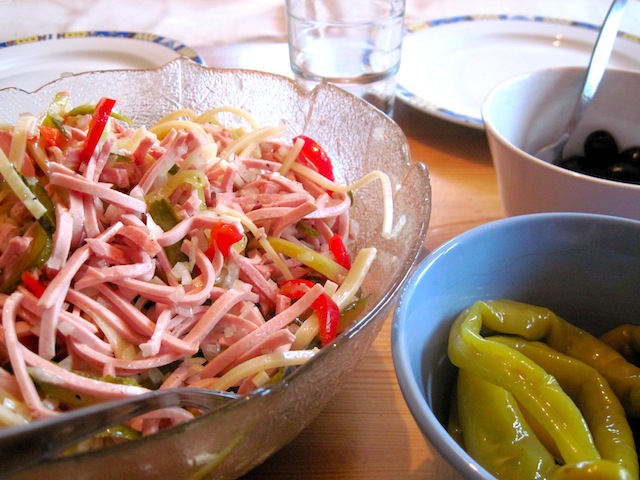Frühstück and Vespern: Friedel’s Fleischsalat
September 20, 2010

My verbal skills are now thoroughly mangled. I’m thinking in three languages, navigating through two cultures, and working my way through something like six time zones. So I’m confused, mostly. All I can say for certain is that my family is keeping me regularly caffeinated and fed (and caffeinated) and that they forgive me for whatever errors my German may contain.
Since joining up with them in the rural south of Germany, I’ve been playing a fun game called, “Can I Say This in Schwäbisch,” in which I say a sentence out loud and then in my head try to sound it out in the garbled southern dialect (the aforementioned third language) my family speaks. Say: Meine Sprache ist ganz durch einander. Think: Moi Sprach ist hey. The result is that I speak a very strange German: either correct, crisp high-German pronunciation with a rolling Southern inflection or the reverse – as if an inhabitant from the Pacific northwest were to cleanly articulate the sentence, “That ain’t nohow the way to go ‘bout it.”
As I speak and eat my way through the week, I’m working out a theory that culturally, the difference between Americans and Germans is a principle of curves and edges. Lets assume that we evolve angularly against our environments in order to navigate them, that in the yin-yang of the universe, there must always be a balance between curves and lines. In this sense, the Americans are outwardly round and inwardly straight and the Germans are outwardly straight and inwardly round.
Pretend I’m not totally jet-lagged and work with me. American culture is loud and big and comfortable. Americans are easy to get to know, are chatty and open. Advertising is seductive and billboards are filled with colors, scripted font, pictures, and sequins. Yet Americans themselves are inwardly direct and goal-oriented, good at general friendships but wary of vulnerability, in relationships less earnest than flippant. Germans, on the other hand, must navigate a squarely-cut culture, where you absolutely must wait for the light to turn green before you cross the street even when there are no cars, where you must separate trash, where this is done and that is done, where signs are two-toned, two-dimensional, and direct. It is not easy to even get to know a German, but once you’ve entered into a pact of friendship, there is what I can only describe as … roundness.
Of course there are exceptions. And as a disclaimer, I’d like to say that this is not a studied, anthropologically measured dissertation, but rather the way I feel, as a German American, navigating my way between these two cultures. It’s the cultural equivalent of synesthesia, where if I close my eyes, I see the color yellow and think of the number five.
As if in mimesis of my theory of roundness, Germans bookend their days with Frühstück and Vespern – breakfast and “dinner.” I say “dinner,” because Vespern isn’t actually dinner, it’s a light evening meal of cold cuts, cheese, bread, and whatever happens to be in the house that doesn’t need to be cooked. I just finished a Frühstück with my aunt in which, for two people, we laid out rolls, soft pretzels, butter, three types of cheese, lax, apple-onion spread, nutella, marmalade, honey, jelly, cereal, banana juice, mineral water, and coffee. Not that we ate all of it or even had a little of everything, just that if, in case we wanted it, it was there.

And the other night, at another aunt and uncle’s house, we finished afternoon coffee and chatted until it was almost dark and then my uncle said, “I’ll just go ahead and make a Fleischtsalat.” (Meat salad is probably a bad translation… you’ll just have to look at the recipe at the end of the blog.) And instead of just a Fleischsalat, there was a plate of cold cuts and salami, a loaf of whole grain bread, olives, pepperoncinis, spreadable cheese, and cold bottles of hefeweizen.

What vespern and Frühstück have to do with my theory of roundness is that if you have already made it inside a German’s house, of course everything will be laid out for you.
I don’t want to confuse roundness with generosity. The symbolism I see in these two meals isn’t about emphatic giving, although that certainly is a part. The roundness comes rather from the time spent gathering everything together and the time spent eating and talking. Every meal is somehow languid.
Now it’s noon; Frühstück is still on the table and I’m eyeing a pretzel, the butter, some lax. I’ve spent the morning drinking espresso and writing – my favorite kind of morning – and thinking about how to reconcile the best of both my cultures within myself. The edges are important too – lists and goals and drive – and I am American, after all. But my meals, at least, I want them round.

Friedel’s Fleischsalat
This is a hard recipe to translate into American Kitchen. In a pinch, bologna can be substituted for the German Wurst (try to use the best brand you can find…). Maggi is an umami-rich sauce (plus MSG) that’s sold in a number of American supermarkets. If you can’t find it, try Knorr’s Liquid Seasoning instead. Dry salad mix is popular in Germany (Knorr Salat Krönung). You blend the packet with oil and water for instant dressing. As far as I know, you can’t find this in the states. Instead, substitute the water for chilled, concentrated chicken broth and some chopped fresh dill and chives.
10 cold cuts of Lyoner or Leberkäse (or bologna if you can’t find German Wurst)
6 pre-sliced slices of Emmenthaler cheese
1/2 of a red pepper
1/2 of a yellow onion
6 small, mild pickles or cornichons
1/4 cup rice wine vinegar
1/2 cup vegetable oil
1/4 cup water
Salt, to taste
Pepper, to taste
Maggi, to taste
Packet of Knorr Salat Krönung
Thinly slice into strips: cold cuts, emmenthaler, red pepper, yellow onion, and pickles or cornichons. Douse with vinegar, vegetable oil, and a little water until contents are coated. Season to taste (aka liberally) with pepper, salt, Salat Krönung, and Maggi
Beautiful.
You sound just as smart as your mom — and I have a question for you —where do you get Lyoner or leberkäse in the states? (I have used bologna for the recipe.) Take care!
Having just spent the weekend in deepest Swabia with my in-laws (my father-in-law is Bavarian even), I can identify with pretty much everything you say. This is hey and freilich that, high German spoken with a southern accent–very different from what I’m used to in Osnabrück. Majoring in German didn’t prepare me for this! :)
Thanks for the fun and poignant read.
PS: Lax–how cute!
i recognize the table with the “frühstück” on it… ;) mmmh
love your blog!
Dear Lyz…thank you for bringing us to the beauty of your table with loved ones in Germany. I remember, still, the lovely aroma of “shared roundness” at table with your family over the years. Miss seeing your beautiful self around here!
Stephanie
Thanx for making me immortal – at least my “Fleischsalat”-recipe (although it is in fact “Wurstsalat” ;-) ). It was wonderful having you with us. Come back soon.
“Uncle” Friedel